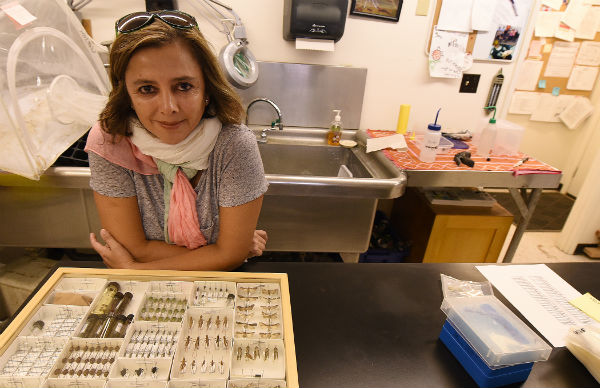
Spudwomen 2016: Silvia Rondon
It’s a long way from the Andean altiplano of Puno, Peru, to the lower Columbia Basin of Hermiston, Oregon. For Silvia Rondon, it’s a journey that started in the rugged highlands – considered to be the origin of the potato – has taken her to Oregon and continues to unfold, with her research taking her back to the altiplano.
Though Rondon grew up in Peru’s capital, Lima, she remembers watching her grandmother plant potatoes on the family farm in Puno.
I would pretty much go every year to visit my grandma, where the main crop that she would grow there was potatoes,” Rondon said. “I grew up seeing how she and her crew handled planting potatoes at the high altitude, and, you know, move forward now and I’m working on potatoes here (Hermiston).”
She received a bachelor’s degree in zoology and a master’s in entomology from the Universidad Nacional Agraria la Molina in Lima, and a Ph.D. in crop science from the University of Illinois at Urbana/Champaign.
Rondon has been an associate professor and Extension entomologist at Oregon State University’s Hermiston Agricultural Research and Extension Center (HAREC). She works with onions, corn, grasses and any high-value crop in the region, but she estimates that 80 percent of the work she and her staff do is focused on potatoes.
She is particularly proud of her insect collection at HAREC, and credits area growers with contributing to her extensive collection of bugs.
“They constantly bring us new things that challenge us in trying to help and identify what it is,” Rondon said.
She and her staff of four undergraduates, two post- doctoral students, a doctoral student and a bio-technician are currently conducting research projects on four different pests: Colorado potato beetle, aphids, psyllids and lygus.
Jonathan Macias, Ira Thompson, Josephine Atnwi, Silvia Rondon, Sudeep Bag,
Ashleigh Banker and Creedence Burnside in the entomology lab at HAREC.
Rondon said that Colorado potato beetle is getting much more attention in the Pacific Northwest to prevent it from developing resistance traits, as it has in the eastern United States. Her lab wants to compare the genetics of eastern and western populations of Colorado potato beetles to determine common genetic links and the evolutionary connection between the two populations.
“My program works a lot on chemical control, because we always need new information regarding how to control these insects,” Rondon said. “So we have been very actively testing different chemicals controlling Colorado potato beetle.”
Rondon said that lygus is fast becoming a species of interest, and predicts we’ll be hearing more about it in the near future.
Josephine Antwi, a Ph.D. student, is running the lygus project in Rondon’s lab. Antwi will be studying lygus distribution in the field.
Rondon said that the first order of business in their current study of lygus is to determine the damage lygus is inflicting on potatoes, and the importance of lygus as a vector for pathogens in potatoes.
“One of the key things to know about this insect is to determine what is the role of Lygus in the potato crops,” she said.
Sudeep Bag, a post-doctoral student, is working on aphids and PVY distribution.
“He has a very ambitious project where we are covering the entire state of Oregon,” Rondon said. “We are trapping aphids and relating that to virus incidences.”
He also is using DNA bar coding to expand the taxonomy of aphids in the field.
In addition to Bag’s aphid research, Rondon said that they have just completed construction of two 20-foot tall aphid towers at HAREC. With the towers, they will be studying the vertical movement of aphids within the potato canopy, she said.
And then there’s potato psyllids, liberibacter and zebra chip disease. Since 2011, Rondon and researchers across the Pacific Northwest have been tracking and working to better understand the traits and movements of psyllids in summer and winter.
For Silvia Rondon, leading potato research in the Pacific Northwest is a means to remain grounded in her homeland of the Peruvian highlands.















